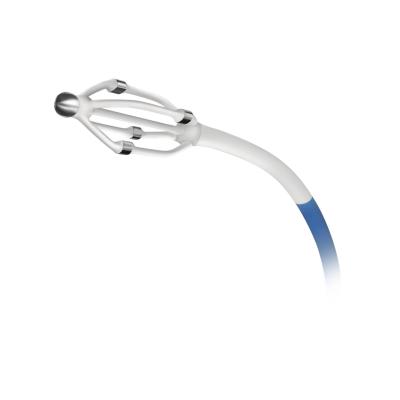
June 3, 2013 — St. Jude Medical Inc. announced that the company’s EnligHTN multi-electrode renal denervation system provides a safe, rapid and sustained reduction in blood pressure measurements after one year. The new one-year study data from the EnligHTN I trial was presented at EuroPCR 2013 in Paris.
Renal denervation is a minimally invasive, catheter-based ablation procedure used to treat patients with drug-resistant hypertension. A series of radiofrequency (RF) energy ablations are administered to create lesions along the renal sympathetic nerves. Typically, normal blood pressure is at or below 120 systolic and 80 diastolic, which is expressed as 120/80 mmHg. Hypertension is categorized as a blood pressure reading greater than 140/90 mmHg. The risk of cardiovascular death is cut in half with every 20 mmHg decrease in systolic blood pressure.
Patients enrolled in the EnligHTN I trial had an average blood pressure of 176/96 mmHg and patients were drug resistant, meaning their blood pressure could not be controlled through medication. At one year, patients treated with the EnligHTN renal denervation system experienced an average systolic blood pressure reduction of 27 mmHg points when measured in an office setting.
One-Year Study Findings:
- An average systolic blood pressure reduction of 27 mmHg points was reported.
- Eighty percent of patients responded to the therapy, defined as a blood pressure reduction of at least 10 mmHg, when measured during an office visit.
- The longer-term safety profile for renal denervation was supported by showing no significant changes in kidney function.
“Hypertension can be difficult to treat, and the need for additional options is great considering the growing number of patients with high blood pressure who are at risk for heart attack, stroke and death,” said Stephen Worthley of the Royal Adelaide Hospital in Australia. Worthley, a primary investigator of the EnligHTN I trial, delivered the study’s one-year findings during a presentation at EuroPCR. “The results of the EnligHTN I study confirm that the early significant reduction in blood pressure is sustained through 12 months, but as important are the favorable renal effects as evidenced by an improvement in some kidney markers. Renal denervation has tremendous potential for patients with severe hypertension who are not responding to medication.”
A prospective, multicenter feasibility study, the EnligHTN I trial treated 46 patients whose blood pressure was considered drug resistant despite taking three or more antihypertensive medications, including a diuretic. To qualify for the study, patients had a systolic blood pressure greater than or equal to 160 mmHg (150 mmHg for patients with type 2 diabetes). Patients in the trial will continue to be followed for a total of two years post-procedure.
“The one-year results of the EnligHTN I trial are important as they further substantiate that blood pressure can safely and effectively be reduced with the EnligHTN renal denervation system in this challenging patient population,” said Frank J. Callaghan, president of the St. Jude Medical Cardiovascular and Ablation Technologies Division. “We are pleased that the study continues to report a sustained reduction in hypertension, potentially providing a long-term benefit for patients whose lives are impacted by this difficult-to-treat condition.”
For more information: visit sjm.com


 January 05, 2026
January 05, 2026 









